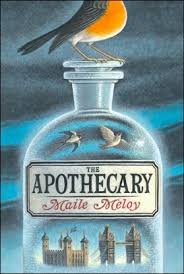The Apothecary, Maile Meloy's first novel for middle grades, wasn't exactly what I was expecting, but it was a pretty good read.
The Apothecary is set in 1952, during the Cold War, when Americans were terrified of a Communist presence, and nations around the world began experimenting with new types of weaponry, namely the atomic bomb. Main character Janie Scott's parents are put on an FBI Communist Watch List, and they find that their only hope of living a semi-normal life is by moving out of the country. So, they relocate to London, leaving Janie feeling uprooted, out of sorts, and mildly depressed. All of that changes when Janie meets a mysterious classmate named Benjamin Burrows - he sets himself apart during a bomb drill when he refuses to "duck and cover," saying that in a real bomb drill, this tiny precaution would offer no salvation. She soon learns that Benjamin's father is an apothecary with some very important secrets. Actually, he's more than an apothecary; he's an alchemist, a magician.

Janie's connection with the Burrows men leads her on some wild adventures, exposing her to dangerous villains, unthinkable magic spells, and a sea journey.
To be totally honest, I got kind of bored towards the end of the novel, which is strange, because that's where the most action was - it just felt a little drawn out to me, I guess. Also, aside from Janie, I felt like the characters were pretty stock. There was the adventurous heroine (Janie), the headstrong, ill-fitted-to-the-family-business boy (Benjamin), the street-urchin sidekick with a Cockney accent (Pip), and the St. Beden's school Mean Girl (Sarah Pennington). Despite the predictability of the characters, I did like the waynarrator Janie described Sarah:
"There are Sarah Penningtons in the United States - you probably know one, I'm sure they exist in France and Thailand and Venezuela. My Sarah Pennington, at St. Beden's, was a near-perfect specimen of her kind," (20).
There is a sequel to The Apothecary - The Apprentices - which kind of surprised me, because I felt like the novel was wrapped up completely and could stand alone. It comes out at the beginning of June, so I'll have to check it out.